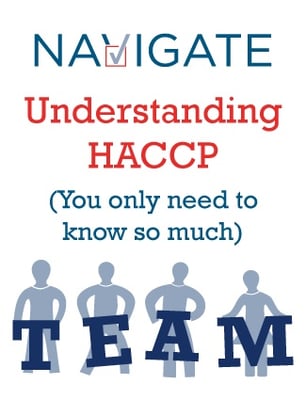Information overload is a major issue when it comes to understanding HACCP.
That’s because most HACCP training programs attempt to cover everything under the sun, and that’s simply too much information for the average person to take in.
Trust vs. Understanding: HACCP doesn’t have to be that complicated.
Our approach to teaching HACCP is to ensure each person has a solid grasp of the information relevant to them and their role. Nothing more, nothing less.
Understanding HACCP. Who needs to know what?
The average food processing plant has the following cast of characters who require some understanding of HACCP:
- HACCP team members
- HACCP team leader
- Operators
- Upper management
All of these people must understand HACCP as it relates to their job.
What specific HACCP knowledge does each team member need?
HACCP team members must be able to do five tasks:
- Describe the product being processed
- Make a list of hazards related to the product
- Conduct a hazard/risk analysis
- Use a decision tree to separate Control Points (CPs) from Critical Control Points (CCPs)
- Build a master plan of CPs and CCPs
A HACCP team leader is responsible for ensuring that the HACCP plan is being carried out properly. This requires a thorough understanding of the above five skills, plus the ability to manage a team.
Plant Operators must know the general plant rules and the jobs they are in charge of. If they are responsible for specific Control Points, Critical Control Points, or any other tasks related to food safety, that’s the part of HACCP they need to understand. Of course, operators with a role in any sort of prerequisite program must understand the associated rules or regulations. It’s important that Operators also know how to identify anything unusual and who to report to once identified.
Upper Management must have a finger on the pulse of the plant at all times to make sure a wide array of targets are being met. If targets aren’t met, it’s up to management to hold people accountable and get things back on track. In the event of a crisis, they have to take control. They are also the ones who will bear the weight of any negative blowback.
The upper management team must understand HACCP as it relates to their plant. In a pita bakery, for instance, they need to understand food safety as it applies to a pita bakery. They don’t need to know which food safety rules apply to a mushroom cannery or a meat processor. When a HACCP plan is done well it acts as a map of what the company has to do to keep food safe. And how the company manufactures safe food is what upper management needs to know.
All our characters (the HACCP team, the HACCP team leader, the operators, and upper management) are part of the same crew. Together, they must have all the skills and knowledge to make safe food. Everybody doesn’t need to know everything, just what is relevant to their work. If our baker in the pita bread plant is responsible for cleaning and traceability, that’s what they need to know and know well. The baker doesn’t need to know the same information as the HACCP team leader.
There are a few other players involved in the processing of food who do need to understand everything involved in HACCP:
- HACCP Specialists (those who help build HACCP plans)
- External Auditors (those who hold processors accountable)
HACCP Specialists and External Auditors are responsible for being familiar with all the risks related to baking pita bread and canning mushrooms.
Simplifying HACCP
At the end of the day, the average HACCP team member doesn’t need to know how to build a HACCP plan. They simply need to make sense of and follow the part of the plan that applies to them.
If your team is having difficulty understanding HACCP, we can help you simplify things.
🆓 Get a feel for our training! 🆓

